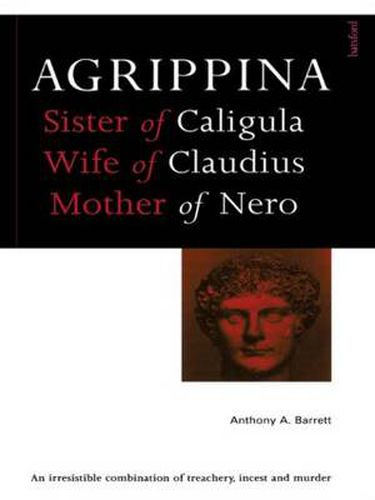Readings Newsletter
Become a Readings Member to make your shopping experience even easier.
Sign in or sign up for free!
You’re not far away from qualifying for FREE standard shipping within Australia
You’ve qualified for FREE standard shipping within Australia
The cart is loading…






Agrippina the Younger attained a level of power in first-century Rome unprecedented for a woman. According to ancient sources, she achieved her success by plotting against her brother, the emperor Caligula, murdering her husband, the emperor Claudius, and controlling her son, the emperor Nero, by sleeping with him. Drawing on the latest archaeological, numismatic and historical evidence, Barrett argues that Agrippina has been misjudged. Although she was ambitious, she made her way through ability and determination rather than by sexual allure, and her political contributions to her time seem to have been positive. After Agrippina’s marriage to Claudius there was a marked decline in the number of judicial executions and there was close co-operation between the Senate and the Emperor. The settlement of Cologne, founded under her aegis, was a model of social harmony. The first five years of Nero’s reign, while she was still alive, were the most enlightened of his rule. According to Barrett, Agrippina’s one failing was her relationship with her son, the monster of her own making, who had her murdered in horrific and violent circumstances. In this provocative and stimulating biography - the first on Agrippina in English - Anthony Barrett paints a startling new picture of this influential woman.
$9.00 standard shipping within Australia
FREE standard shipping within Australia for orders over $100.00
Express & International shipping calculated at checkout
Agrippina the Younger attained a level of power in first-century Rome unprecedented for a woman. According to ancient sources, she achieved her success by plotting against her brother, the emperor Caligula, murdering her husband, the emperor Claudius, and controlling her son, the emperor Nero, by sleeping with him. Drawing on the latest archaeological, numismatic and historical evidence, Barrett argues that Agrippina has been misjudged. Although she was ambitious, she made her way through ability and determination rather than by sexual allure, and her political contributions to her time seem to have been positive. After Agrippina’s marriage to Claudius there was a marked decline in the number of judicial executions and there was close co-operation between the Senate and the Emperor. The settlement of Cologne, founded under her aegis, was a model of social harmony. The first five years of Nero’s reign, while she was still alive, were the most enlightened of his rule. According to Barrett, Agrippina’s one failing was her relationship with her son, the monster of her own making, who had her murdered in horrific and violent circumstances. In this provocative and stimulating biography - the first on Agrippina in English - Anthony Barrett paints a startling new picture of this influential woman.